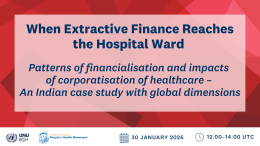Recommendations developed by UNU-CPR’s Finance Against Slavery and Trafficking (FAST) initiative have been unanimously adopted by the 20 Member States of an influential regional body dedicated to addressing money laundering and the financing of terrorism in eastern and southern Africa.
The Eastern and Southern Africa Anti-Money Laundering Group (ESAAMLG), which held its 46th conference this week in Botswana, made the fight against modern slavery and human trafficking a fixed agenda point, a first for a regional body of its kind. The FAST recommendations will now be subject to an ongoing review mechanism in which Member States will need to regularly demonstrate their progress against each recommendation.
Attended by more than 500 delegates, the conference provided an opportunity to shape eastern and southern Africa’s response to money laundering, terrorist financing, and related offences. FAST’s intervention followed a decision by ESAAMLG to make modern slavery and human trafficking one of its key priorities moving forward.
According to figures reported in the ‘Global Estimates of Modern Slavery,’ a report published by Walk Free, the International Labour Organization, and the International Organization for Migration, around 7 million people live in conditions of HT/MS in Africa – 3.8 million in conditions of forced labour and 3.2 million in forced marriages. However, it is generally agreed that the number of persons from Africa trafficked to different regions across the world is significantly higher.
To help address Africa's modern slavery challenge, FAST made the following recommendations to ESAAMLG:
- Use training materials and other relevant resources developed by FAST’s team of experts, including a training course for Financial Intelligence Unit (FIU) analysts on Modern Slavery, developed jointly with the global FIU training provider, the Egmont Centre of FIU Excellence and Leadership (ECOFEL).
- Ensure that financial institutions and other relevant entities routinely create suspicious activity reports on modern slavery and human trafficking. Authorities can also raise awareness and make the topic a priority through its inclusion in national money laundering and terrorist financing risk assessments.
- Provide tools and resources to help enhance the quality of suspicious activity reports, via the identification and sharing of high-risk activities, as well as operational intelligence gathered through public-private partnerships.
- Ensure that suspicious activity reports can be automatically identified as modern slavery related, to allow for a prioritized assessment by FIUs and the swift initiation of potentially life-saving criminal investigations.
- Enhance collaborations and efficient data exchange between FIUs, their foreign counterparts, and law enforcement.
Dr Frank Haberstroh, Anti-Money Laundering and Sanctions Lead at UNU-CPR, who represented the FAST initiative at the Conference, commented: “I commend ESAAMLG for supporting the fight against modern slavery and human trafficking and making these crimes a fixed agenda point for their future meetings. This is the first time that a regional body dedicated to money laundering and the financing of terrorism has prioritized modern slavery in this way. By doing so, they have demonstrated real leadership and we hope that other similar bodies around the World follow their example.”
Muluken Yirga Dubale, ESAAMLG’s Senior Legal and FIU Expert on Anti-Money Laundering and Counter-Terrorist Financing, added: “Modern slavery, trafficking in human beings, and associated money laundering offences are significant challenges in Southern and Eastern Africa. Given the scale of this problem and considering ESAAMLG’s role in the global anti-money laundering and counter-terrorist financing network, we felt it was necessary to prioritize modern slavery and adopt FAST’s recommendations to address this issue. At our next meeting in April, Member States will update the Task Force and Financial Intelligence Unit Forum of ESAAMLG, demonstrating how they have implemented the recommendations.”



